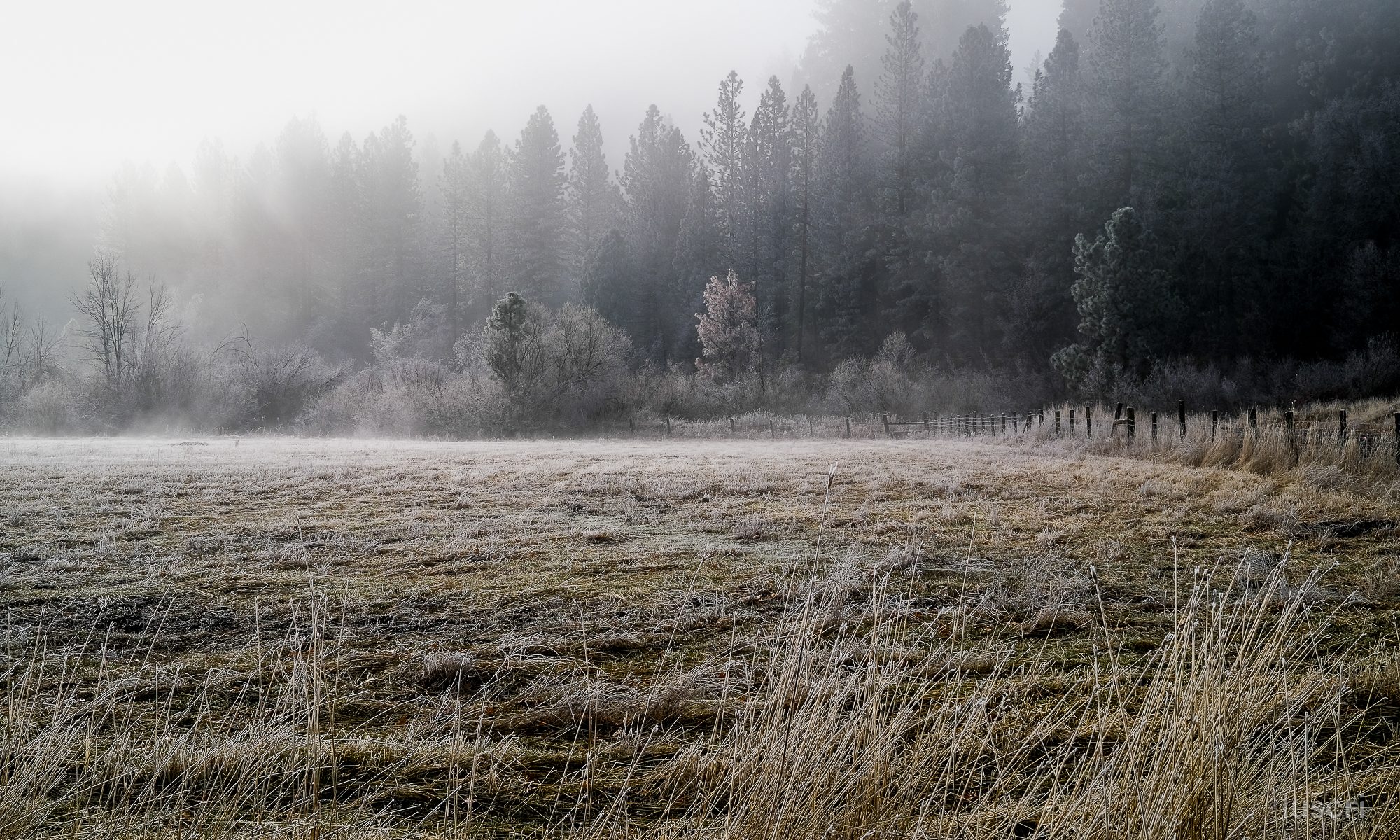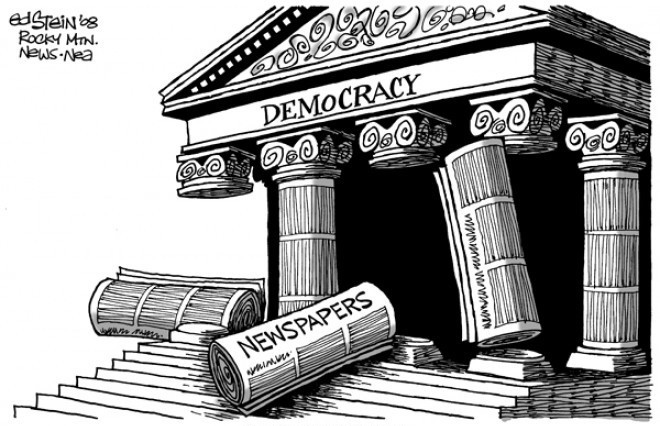
Trump’s war on the media is a THREAT to democracy? Please. Here you go again with hysterics, hyperbole and chicken-little reports.
Dear, media, your estimation of your importance to our democracy is vastly overblown.
As a journalist, I know. Here’s one reason why:
Too many of you journalists are way too full of yourselves. Your vaunted “objectivity” is an antiquated notion believed by numbskulls. I don’t blame you for this—you’re only human. But humans are incapable of objectivity. Especially those who scribble in newsrooms.
And, most especially, those who still fancy themselves part of the … dun dun DUN! … Fourth Estate. What? Is this a secret snobby society? It’s not secret, but it IS secretive … and, yeah, kinda snobby.
Fourth Estate?
The Fourth Estate can be defined as: A societal or political force or institution whose influence is not officially recognized. The Fourth Estate commonly refers to the news media, especially print journalism or “the press.”
In 1841 England, Thomas Carlyle, borrowing the phrase from Edmund Burke, used it to trumpet the power of the press in the reporters’ gallery in Parliament. He saw the press as an essential fourth estate tasked to “check” the three traditional estates of the realm: the church, the nobility and the commoners.
In the U.S., the fourth estate—better known as “the media”—has no direct equivalent to the English estates of the realm. But it DOES serve as an independent check on our three government branches.
How it’s supposed to work
Let’s say the executive branch, the president, acts in ways that are potentially criminal or “undemocratic.” Journalists ferret out information and evidence that exposes wrongdoing. They “blow the whistle” on the president just like they did when breaking the Watergate scandal. Boom! Busted.

By the way, members of the fourth estate—I’ll call them “Estatesmen” because it’s fun—raise the specter of Watergate any time they perceive an abuse of power by an administration. After all, breaking Watergate is the American press’ 20th-century crowning achievement.
Justices have more fun
So, what of the other two government branches? The judicial branch seems untouchable by Estatesmen. But then, legal decisions take much more time and effort to understand in order to attack. Plus, many of the big rulings have lately gone the way Estatesmen think they should.
The legislative branch—Congress—has always been open season. And it’s easier to take them down than it is a president. So, in a sense, the media does serve as a check on at least two of three genuine branches of government.
Which begs the question: Who CHECKS the media?
Check, yes. Government branch, no.
The notion that the modern media is a “Fourth Estate” that functions unofficially as a branch of government is merely a rhetorical device, not a serious statement of fact. It’s used to describe the power of the press in the realm of politics.
The American media is supposed to be this—a standard bearer for our right to freedom of speech protected by the First Amendment. Journalists, as citizens and members of the press, simply exercise their freedom of speech for a living—and are SUPPOSED to do so to INFORM us.
Specifically, journalists are trained to ask effective questions and craft stories for our information consumption. They inform us about our government by gleaning information through access to politicians, press conferences, and other info-gathering opportunities.
This should be the media’s function. There’s no mysterious, monolithic “Fourth Estate.” The fourth estate nonsense sounds impressive, but it’s fantasy and the stuff of Hollywood. It’s merely a media self-importance construct borrowed from an old English idea.
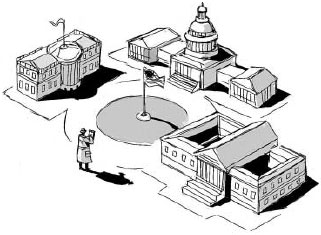
From informers to influencers
The fourth estate biz is silly. But it’s not dangerous like this truism:
Our media no longer merely provides information; they seek to shape public opinion. And what’s worse—they use their power to influence government policy so that it conforms to what they think is best for us.
That’s why, as a trained journalist and thoughtful citizen, the following relatively new teaser headline approach irks me … to the fourth estate.
It goes like this:
“Issue X: Here’s what you need to know” yada yada. Uh, excuse me; don’t tell me what I need to know. I can decide what I need to know based on raw information.
Hey, media—just do your jobs—INFORM me. Don’t try to INFLUENCE me by telling me what YOU think I NEED to know. The attempt to influence us and shape our opinions used to be more subtle. Not anymore. It’s obvious, ubiquitous … and dangerous.
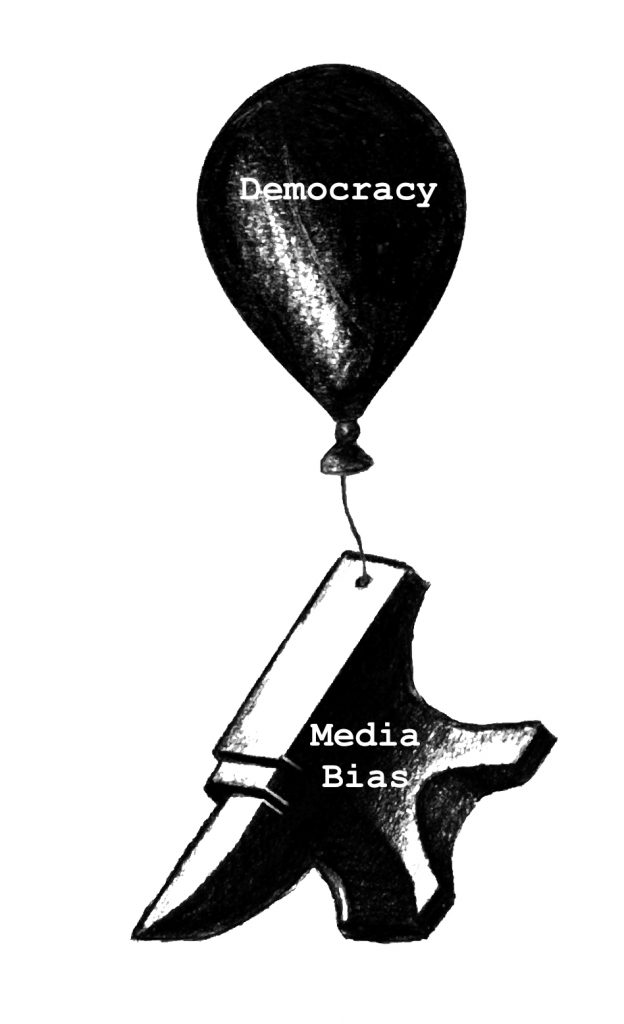
The media’s self-appointed mission to shape opinion and effect change—change they deem best for us— THIS is the threat to democracy.
Journalists not entertainers
Just to be clear, when I refer to the media, I’m not talking about entertainment/partisan media—Fox, MSNBC, HuffPo and others. O’Reilly, Hannity, and Maddow aren’t journalists; they’re personalities and “opinioneers.”
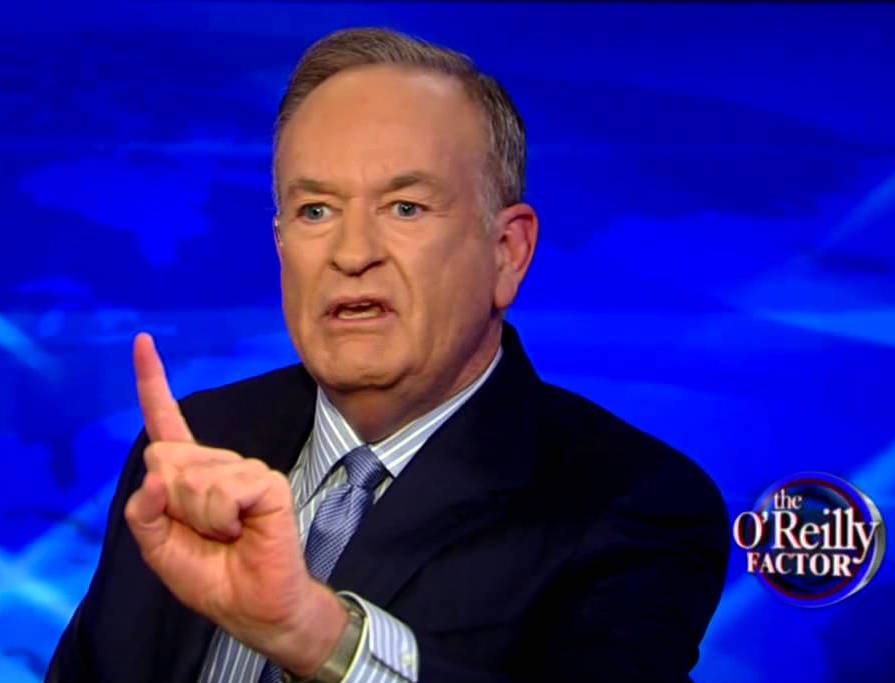
It’s not about you, Bill. O’Reilly: Passion and pompousness in one “pithy” package.
I’m talking about hard-core news media like ABC, NBC, CBS, CNN, BBC, The Washington Post, The Los Angeles Times, The New York Times, et al.
We should expect over-the-top, red-hot, partisan and biased “news” from “opinioneers” and those who are under no illusions about what they provide and the bias they bring with it.
The real pretenders are the “venerable” journalists—the stodgy Peter Jennings, Tom Brokaw, Woodward and Bernstein and now Jake Tapper types who claim objectivity and professionalism, but deliver biased, often overwrought opinion news.
And, by the way, media bias is not a right-wing conspiracy theory. Bias transcends media—it’s a uniquely and inextricably human characteristic.
Giggling grad student
While sitting in classes earning my master’s degree in journalism at the University of North Texas, I often had to stifle giggles when listening to one of my professors teach Media Ethics. As if the seriousness of the fourth estate stuff wasn’t funny enough, he ventured this hot opinion:
“You know, this thing about the media being biased, it’s not really true. The media is remarkably objective.”
I nearly fell out of my chair. At the time, I had recently finished a few months of internships at two local TV stations. The freshly tenured professor, I’ll call him Dr. Lane, was 10 years or so into his career, first in media development in Africa and the previous three years on faculty at UNT.
The professor probably had less recent newsroom experience that I did.
Typically, I would’ve challenged him on his ludicrous statement, as I had on a few others, but I couldn’t trust myself to choke down laughter. Plus, from the looks of a few of the other grad students, I didn’t have to. It was rich.
How do newsrooms seek to influence public opinion and, by extension, government policy? Allow me to show you the ways.
Media bias: Tricks of the trade
Story/no story
Now this is timely. Have you noticed how the media treats virtually identical circumstances involving Republican and Democratic presidential administrations in polar opposite ways? Positively/neutrally or negatively?
Look at these photos and tell me; is there an issue? And if there is a legitimate issue, how are the circumstances any different?
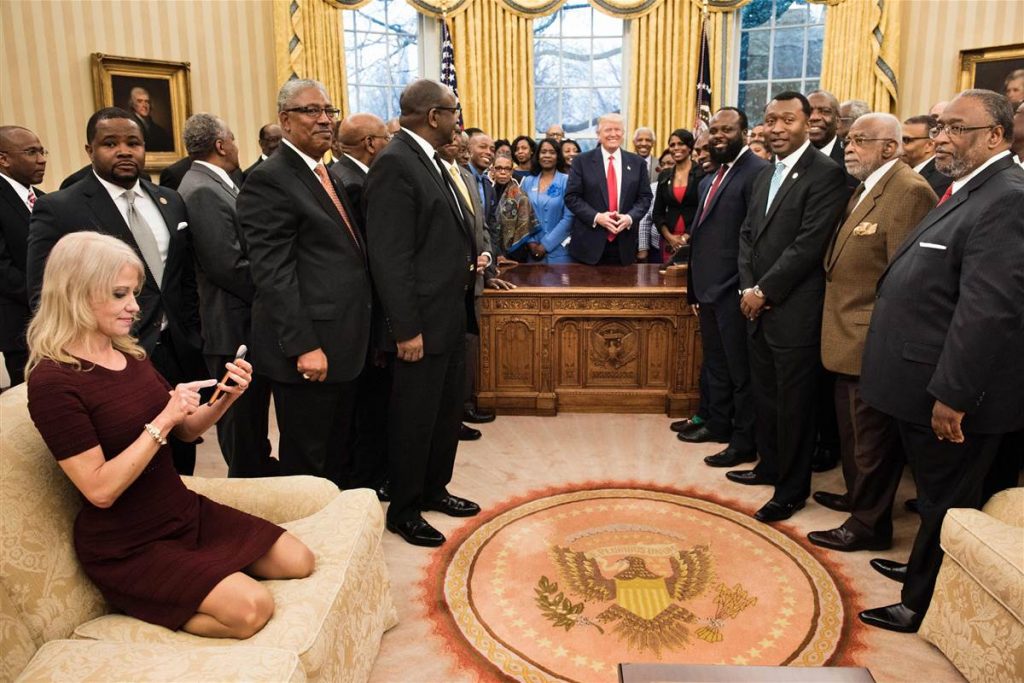
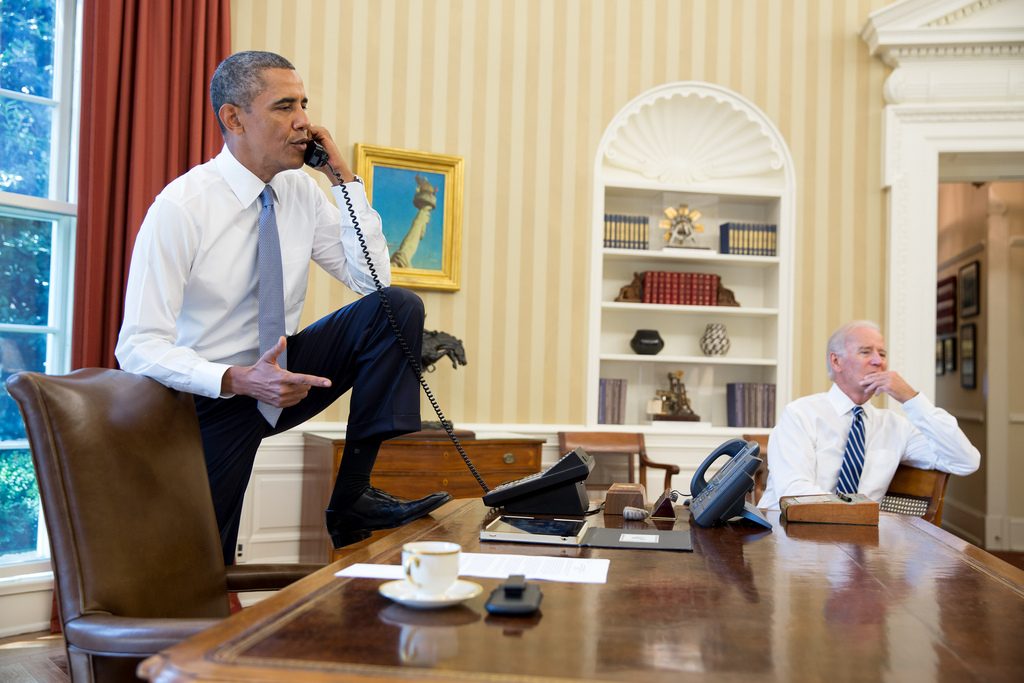
Conway and Obama. Both work(ed) in the Oval Office. Both have at least either a foot or a shoe on a piece of furniture in the Oval Office.
Judging from media coverage, one is a HUGE story; the other is a non-story. Granted, the press covers stuff that sets Twitter and partisan media on fire. I get that. But if they cover one instance, shouldn’t they cover the other? They should, but don’t because they’re biased and agenda driven.
If either is disrespectful, shouldn’t the President of the United States be held to a higher standard? Wait? Is it disrespectful of a race? Does this look disrespectful?
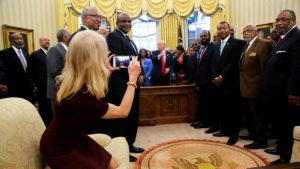
More media bias
Story selection
Subjective editors select stories, headlines and photos that reflect their news entity’s voice (politics). Reporters write stories that push viewpoints they hold.
Perspective omission
This is the practice of omitting a perspective by ignoring it. Try this: Familiarize yourself with conservative and progressive perspectives on an issue. Then look for both viewpoints in an article. This is Journalism 101.
Story placement
Hiding a story is as simple as burying it. Because most people read only headlines, one can downplay stories supportive of an opposing view by burying them deep in a Web or printed page.
Photo bombing
Want to make someone look foolish? Drop in an unflattering photo. Better yet, match it with a subtle dig in the headline.

The bomb above offers a two-fer bias benefit: Unhinged “hate” and small-handed compensation.
Story suppression
Want to suppress a story that could hurt your candidate’s election chances? Don’t cover it or give it short shrift even though you know that if it were about the opponent, you’d run it with everything you’ve got.
Labeling
The media’s power to label people is subtle, but potent. Conservatives are stigmatized as “alt or far right,” “ultra-conservative,” or “right-wing extremists,” while far lefties are “progressives,” “liberals,” or “moderates.”
Wait a minute, doofus—I haven’t noticed any of this. Prove it.
You prove it—to yourself. Gather information. Make up your own mind. But don’t be influenced by anyone you don’t know and/or respect.
Misdirected passion
It only takes a tiny twist to turn information dissemination into influence shaping. I’ve worked in newsrooms. I understand journalists and what many think about government. They’re smart and passionate, which makes them prone to activism.
Think journalists aren’t biased when it comes to politics? Trust me—they are. And like most persuasive, passionate people—they want you to think like they do. And they’re willing to help you think like they do by shaping your opinions on the issues.
Journalists know that influencing today’s media consumer is child’s play.
Most media members aren’t hacks. They know exactly what they’re doing. Activist journalists are blinded by their sense of the “rightness” of their causes. And whether they realize it or not, they sacrifice journalistic integrity for it.
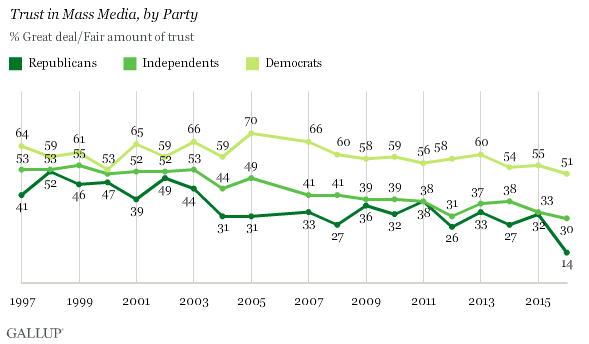
Objective journalism? Humanly impossible
Journalistic objectivity is an impossibility. We all have our bents, perspectives and preferences. Objectivity is merely something to strive for. The problem is that many in the media don’t even bother striving anymore.
They seem more interested in helping craft the nation into their version of what America should be. And they want us on board. If for no other reason than to help elect leaders who share their vision.
This is activism not journalism. And IT, not Donald Trump’s silly, immature war with supposed “fake news,” is a threat to our democracy.
Hey, media, will you please stop the over-the-top apocalyptic warnings about threats to democracy and focus on your true calling? Strive for objectivity. Leave your politics in the break room. Inform us.
No president can revoke the First Amendment. Trump’s press war is nothing but thin-skinned, childish behavior. The threat you face is our distrust.
And no one can make you irrelevant, but you.
